Winter 2024 Newsletter
Swift response to first Aedes aegypti detection in Alameda County in 9 years
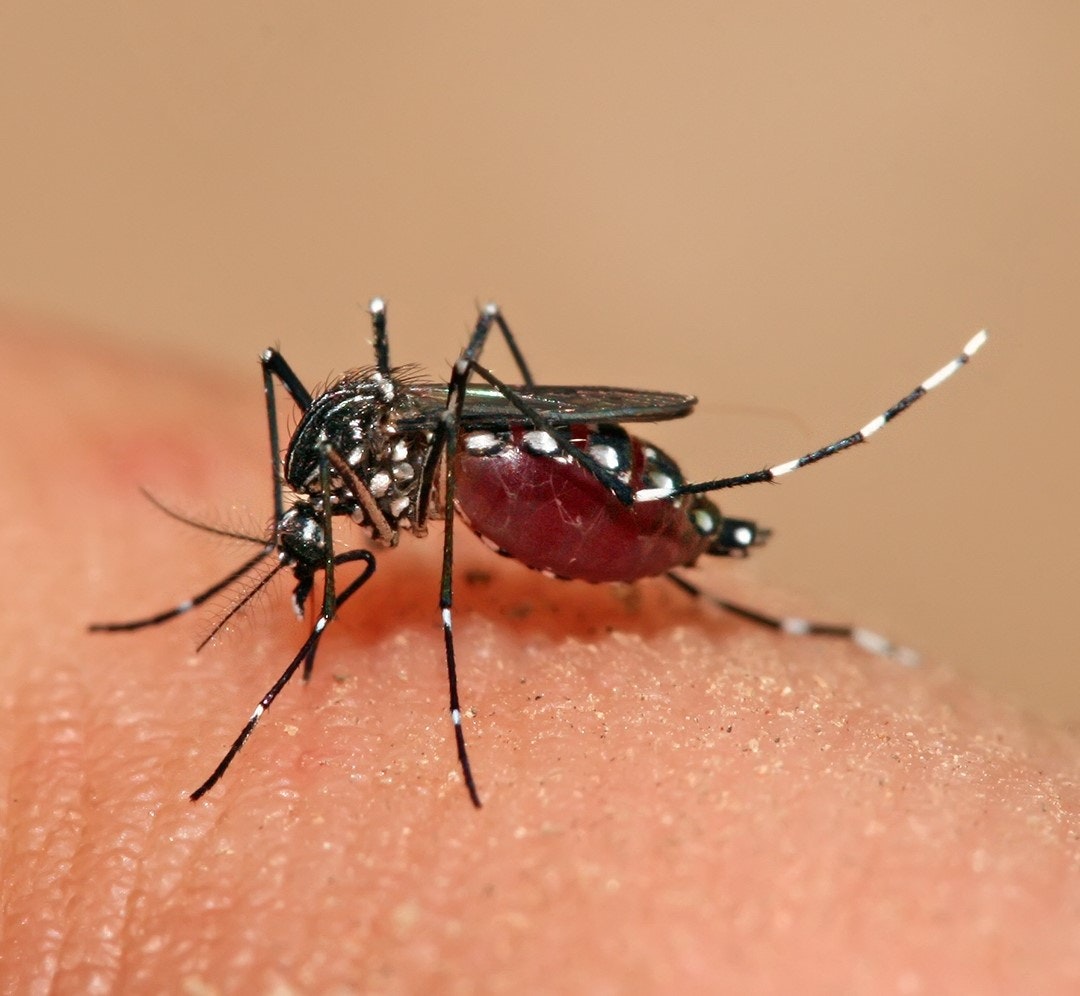
After years preparing for invasive Aedes mosquitoes, on October 9th staff confirmed Alameda County’s first detection of Aedes aegypti since 2015, this time in Pleasanton. The invasive mosquito was found in a trap staff placed near the Alameda County Fairgrounds area in response to a recent West Nile virus detection. In accordance with our Invasive Mosquito Species Response Plan, multiple individuals confirmed the species before deploying our full response plan. District staff jumped into action immediately, each department working to prepare for door-to-door inspections starting October 10th. Coordinating inspections for over 700 homes required an “all hands-on deck” approach and the district was well prepared.
The lab staff set up mosquito traps and mapped out locations. Field staff split into teams of two and divided up the homes to visit. The IT department worked diligently to add a layer to our database to ensure the inspection data from the field would instantly update. The outreach team developed handouts, updated the website, and contacted key partners in Pleasanton such as City Hall, the Pleasanton Police Department, and Pleasanton Unified School District. Over the next few weeks, the majority of staff focused on Pleasanton, conducting yard inspections, deploying mosquito traps, and fielding questions online and over the phone. We also worked with local groups such as CERT for Pleasanton and Livermore to educate members of the public about the invasive mosquito.
Whenever the team found a new Aedes aegypti mosquito, the area to search would increase. In November, after the first few days of rain and decreased detections, the district scaled down the number of staff conducting door to door inspections, and addressed other mosquito habitats throughout the county. By early December, district staff had inspected over 1,030 properties and found 12 additional adult Aedes aegypti mosquitoes and 15 larvae. As the weather has cooled and rain has flushed out a lot of standing water, the district continues to inspect traps and answer questions from the public about Aedes aegypti. Staff are also updating details to the Invasive Mosquito Response Plan and preparing for new inspections and outreach in 2025. While no one was excited to see Aedes aegypti in Alameda County, the staff was well prepared and quickly shifted focus to stop the mosquito from spreading.
State leaders visit ACMAD office
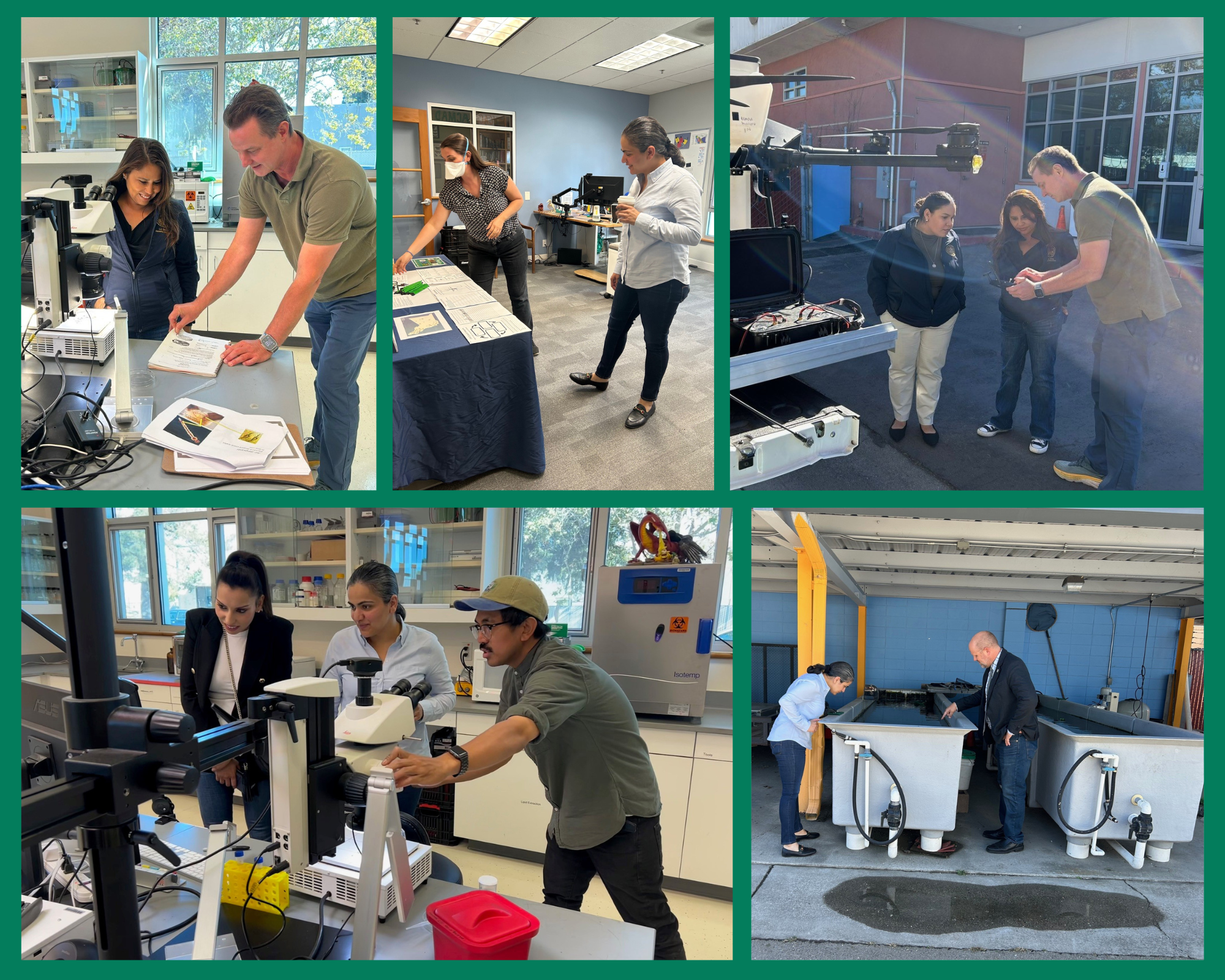
In October the district hosted two California lawmakers, Assemblymember Liz Ortega for District 20 and State Senator Aisha Wahab for District 10 at the office. Both lawmakers learned how the district uses the three pillars of mosquito control, operations, laboratory and outreach, to decrease mosquitoes in Alameda County. The leaders and their staff had the opportunity to learn about school curriculum, look through lab samples, see mosquitofish and ask questions about their local areas. Both visits resulted in enhanced community outreach to their local districts. Thank you to both Assemblymember Liz Ortega and State Senator Aisha Wahab for learning about Alameda County Mosquito Abatement District in person.
Events, presentations and conferences

Top left image: Public Outreach Coordinator Judith Pierce presenting to 1st graders about mosquitoes in Alameda. Top Right Image: A message from a Pleasanton resident on NextDoor stating "Thanks for updating the NextDoor community on the process you're making on eradicating these dangerous pests from Pleasanton." Middle Left image: A slide from the CERT presentation Judith led for Tri-Valley residents about Aedes aegypti. Middle Right image: Lab Director Eric Haas-Stapleton chats with Board Trustee President Cathy Roache at the Alameda County Agriculture Office Open House, to showcase the Lightening and drone. Bottom Left image: Assemblymember Liz Ortega with district staff. Bottom right image: District staff at the Entomological Society of America's Annual Conference in Arizona. Lab Director Dr. Eric Haas Stapleton led a symposium about his mentor, Professor and longtime former trustee Dr. Jan O Washburn, at the conference.
EV Truck charges drone quickly, which increases staff efficiency
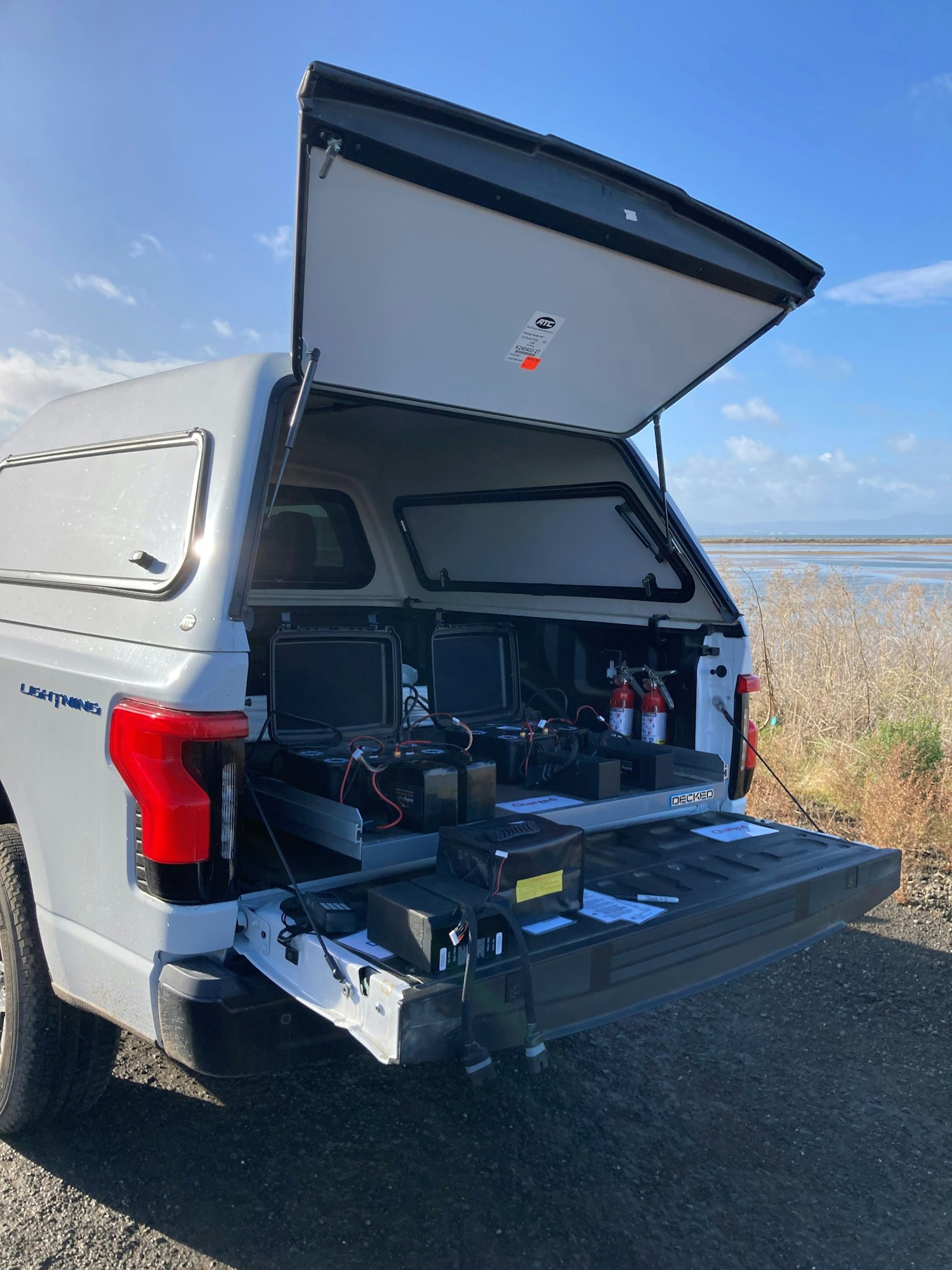
The district was founded over 90 years ago to contend with mosquitoes that thrive in the marshlands along the coast of Alameda County. Much of the district’s work in the past nine decades required driving in the marsh to apply mosquito specific pesticide by hand or from a hose attached to a vehicle, which is effective but time consuming. In the past seven years the district has begun to use drones to apply pesticides in less accessible areas of the marsh. Staff, led by Lab Director Dr. Eric Hass-Stapleton, have streamlined the process and now over 30 acres of marsh can be treated in less than an hour! Staff load the drone with up to 40 pounds mosquito specific pesticide, and then the drone lifts and goes to a predetermined location, where it disperses the pesticide. Staff members who operate the drones are licensed by the Federal Aviation Administration and California Department of Pesticide Regulations and receive regular training from professional organizations to ensure they are up to date on best practices in operating a drone for mosquito control. The district recently purchased a new fully electric truck, a Ford F-150 Lightening, which comes with a large capacity battery. The Lightening truck is powered by solar panels at the ACMAD office. The drone usually remains airborne for around 5 minutes before requiring a recharge. With the Lightning, operators can quickly rotate batteries through its charging system, enabling uninterrupted operations. By taking advantage of the Lightening’s battery, the district can be more efficient with staff time while also providing a more carbon friendly way to charge the drone.
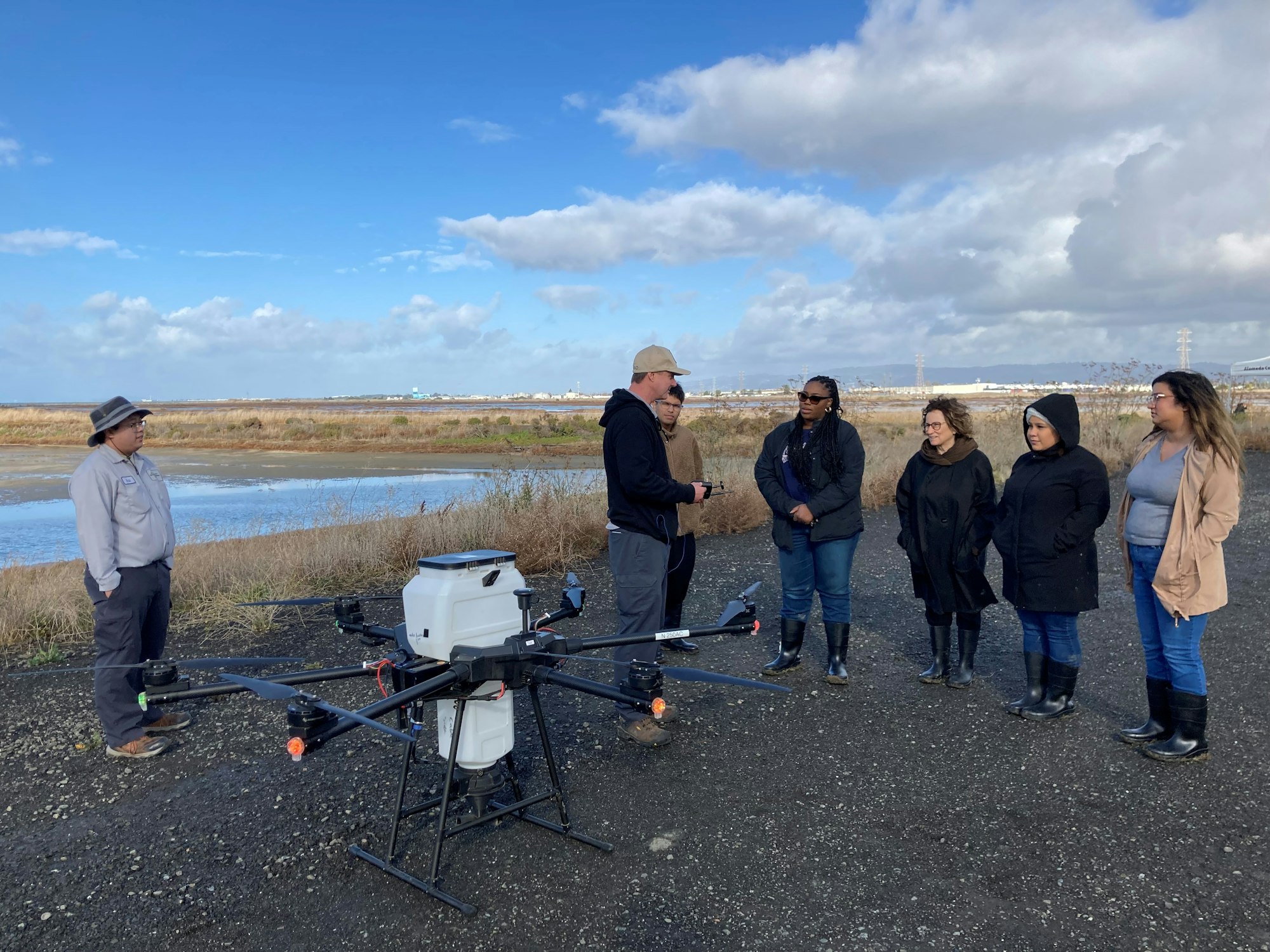
Social Media Moment
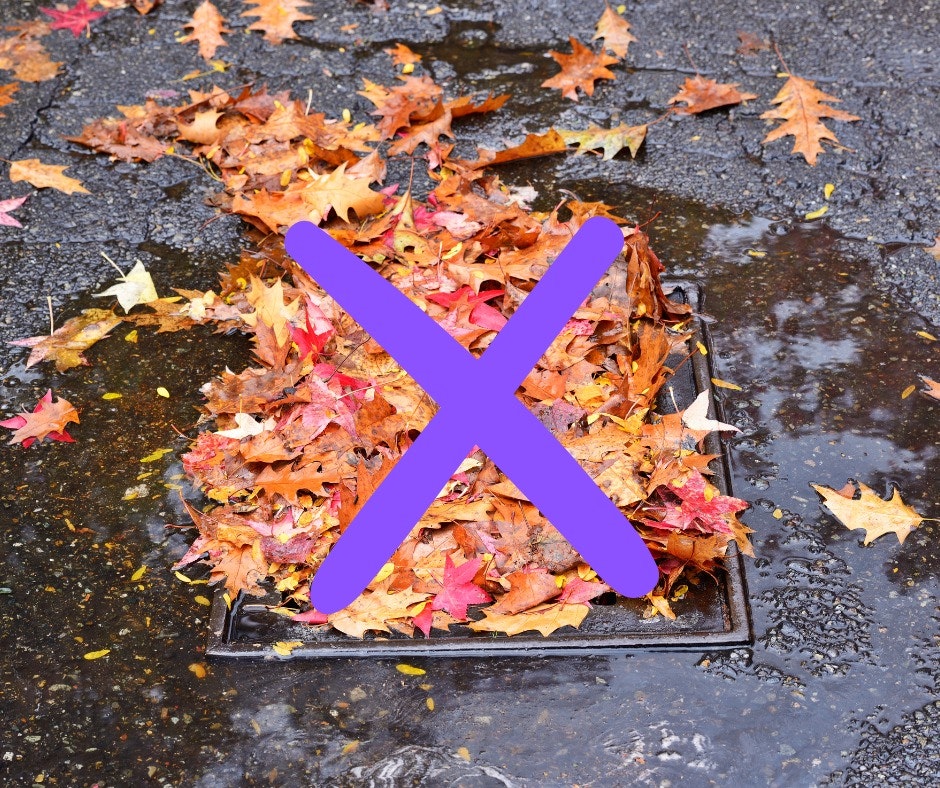
If your gutters look like this, remove the leaves ASAP. Not only can it clog sewers and lead to flooding, but if the water nearby stands around too long, it can also provide an opportunity to produce mosquitoes. Place leaves in the green waste or compost instead of your sewers.
West Nile Update

As we close out the year, ACMAD found 53 dead bird with WNV and 19 WNV positive mosquito pools in 2024. For the winter months the Dead Bird Hotline is suspended, and our office will not collect birds from the public, but we will again starting on April 1st, 2025.
Remember, mosquitoes can breed all year long in the Bay Area, so preventative activities such as removing standing water, adding mosquito fish to ponds, troughs, and neglected swimming pools will reduce our risk of West Nile virus. This is especially true when we have days of rain followed by days with lots of sunshine. Visit our backyard checklist to see common places where mosquitoes produce.
